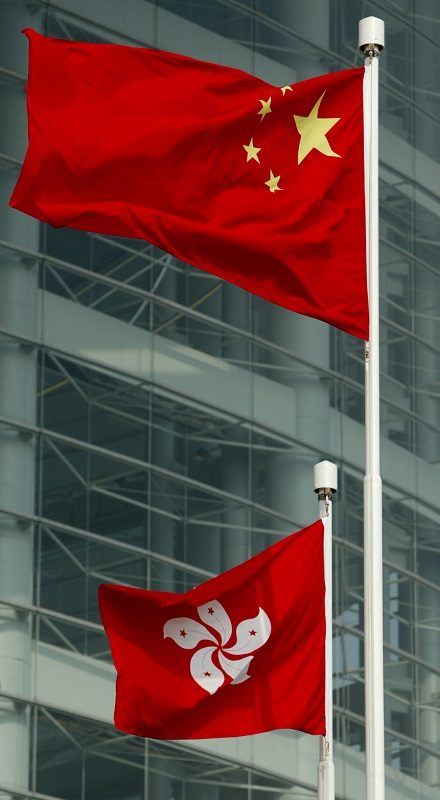
China (top) and Hong Kong flags fly in Hong Kong during a flag raising ceremony to mark the seventh anniversary of the handover of Hong Kong to China July 1, 2004.
13:37 JST, August 23, 2021
It is a move that could destabilize Hong Kong’s standing as an international financial hub, which it has established based on the “one country, two systems” principle. For China, too, the losses could be enormous.
China is considering applying its anti-foreign sanctions law to Hong Kong, which stipulates measures against sanctions imposed by foreign governments. The law went into effect in mainland China in June, but Hong Kong was considered exempt under the one country, two systems arrangement.
Among other sanctions, the United States has recently frozen the assets of some senior Hong Kong government officials over the crackdown on pro-democracy activists there. In line with this, foreign financial institutions in Hong Kong have taken measures such as banning transactions by those subject to the sanctions.
China’s anti-foreign sanctions law prohibits such cooperation with U.S. sanctions and stipulates that individuals and organizations involved in implementing sanctions are subject to such penalties as deportation and the seizure of property within China. The law also allows people whom Beijing regards as “victims” of sanctions to file a lawsuit for damages.
Foreign companies operating in Hong Kong can be said to be caught in a double bind of either continuing to enforce Washington’s sanctions or reviewing their course of action for fear of retaliation from Beijing.
China is obviously trying, through the law, to undermine the effectiveness of sanctions imposed by the United States and European countries.
In July, Washington warned Hong Kong-based U.S. companies that they were at increased risk of data breaches and other incidents, due to tightened surveillance by Hong Kong authorities.
Development cannot be expected in an uncertain business environment where legitimate corporate activities could be impeded by authorities. If foreign companies withdraw their operational bases, Hong Kong’s position as an international financial hub will inevitably deteriorate.
In anticipation of this, China is bolstering measures to increase investment and financial transactions between mainland China and Hong Kong. Beijing must be calculating that the vitality of Hong Kong can be maintained if Chinese companies raise capital through the Hong Kong market and expand investment in mainland China.
But if that happens, Hong Kong will become a “financial city of China” and can no longer be called an international financial center. It will also represent the loss of its unique nature in economic terms.
Hong Kong’s democracy is dying as a result of the national security law, which went into effect in June last year. Crackdowns have been expanded from dissidents to political organizations, media outlets, labor unions and citizen groups.
Such actions under the national security law and the anti-foreign sanctions law violate the 1984 joint declaration between China and Britain. The declaration states that Hong Kong is to maintain its existing capitalist system and lifestyle for 50 years after its return to China in 1997.
Japan, the United States and European countries must continue to raise objections to China’s violation of international agreements.
— The original Japanese article appeared in The Yomiuri Shimbun on Aug. 23, 2021.
Top Articles in World
-

Israeli Ambassador to Japan Speaks about Japan’s Role in the Reconstruction of Gaza
-

Videos Plagiarized, Reposted with False Subtitles Claiming ‘Ryukyu Belongs to China’; Anti-China False Information Also Posted in Japan
-

North Korea Possibly Launches Ballistic Missile
-

Chinese Embassy in Japan Reiterates Call for Chinese People to Refrain from Traveling to Japan; Call Comes in Wake of ¥400 Mil. Robbery
-

Russia: Visa Required for Visiting Graves in Northern Territories, Lifting of Sanctions Also Necessary
JN ACCESS RANKING
-

Japan PM Takaichi’s Cabinet Resigns en Masse
-

Japan Institute to Use Domestic Commercial Optical Lattice Clock to Set Japan Standard Time
-

Israeli Ambassador to Japan Speaks about Japan’s Role in the Reconstruction of Gaza
-

Man Infected with Measles Reportedly Dined at Restaurant in Tokyo Station
-

Videos Plagiarized, Reposted with False Subtitles Claiming ‘Ryukyu Belongs to China’; Anti-China False Information Also Posted in Japan
























